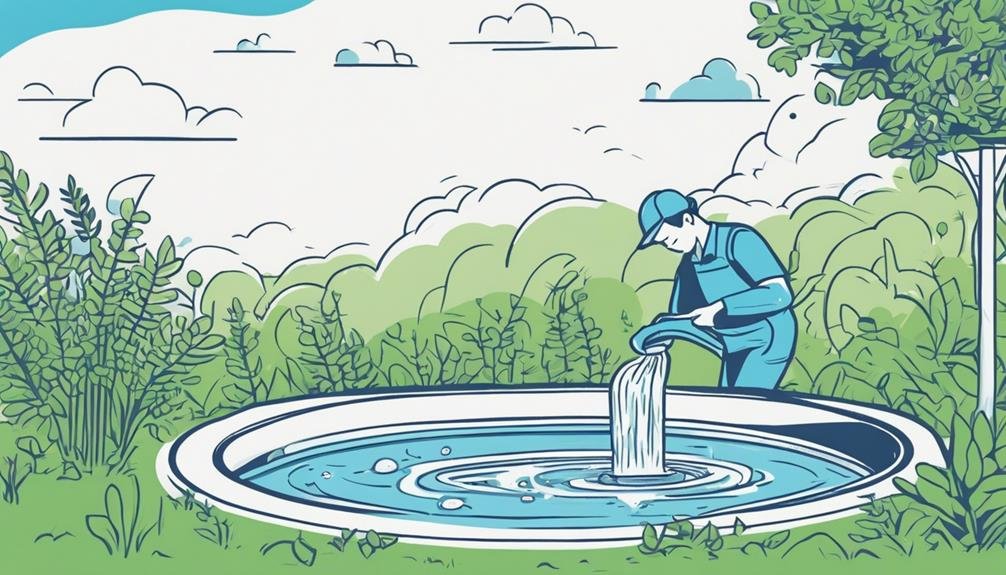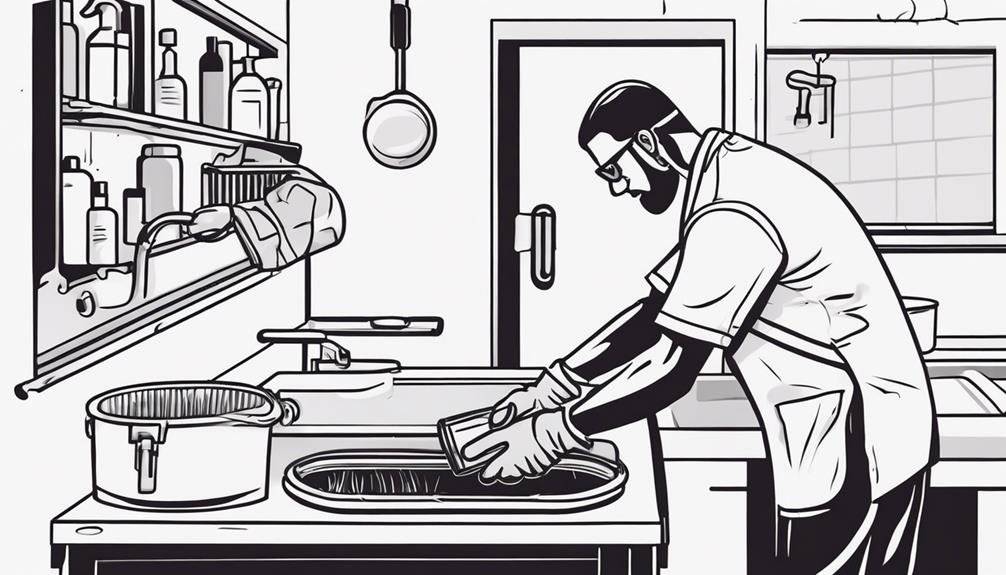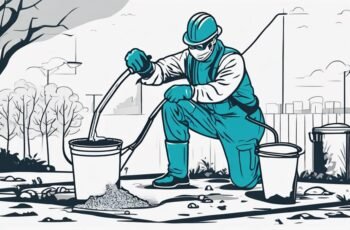Visualize a serene backyard, the air filled with the scent of freshly cut grass. Now, imagine the peace disrupted by a septic tank issue.
Wondering how to maintain this crucial system without harming the environment? Discover ten eco-friendly DIY septic tank cleaning tips that will not only keep your system running smoothly but also benefit the planet.
From natural enzyme cleaners to regular pumping schedules, these tips will help you take care of your septic tank in a sustainable way.
Key Takeaways
- Use natural enzyme cleaners for effective waste breakdown and septic tank maintenance.
- Maintain a regular pumping schedule to prevent costly repairs and ensure system efficiency.
- Opt for eco-friendly cleaning products to promote a healthy septic system and reduce environmental impact.
- Conduct regular leak inspections and professional assessments to prevent major septic issues and ensure longevity.
Natural Enzyme Cleaners

To effectively maintain your septic tank's health and cleanliness, consider incorporating natural enzyme cleaners into your routine. These natural cleaning alternatives, often made from simple home remedies, can help in breaking down organic waste and preventing clogs in your septic system. DIY enzyme solutions are easy to make and can be highly effective in promoting the proper functioning of your septic tank.
One of the most popular homemade solutions involves mixing yeast, sugar, and warm water to create a powerful enzyme cleaner. This mixture can be poured down your drains regularly to keep the enzymes active in breaking down solid waste. Additionally, adding citrus peels or vinegar to the mix can enhance the cleaning properties and leave a fresh scent in your pipes.
Regular Pumping Schedule
Consider establishing a regular pumping schedule to ensure the optimal functionality and longevity of your septic tank system. The pumping frequency of your septic tank depends on various factors, including the tank volume and the number of occupants in your household. As a general guideline, septic tanks typically require pumping every 3 to 5 years. However, if your household has a higher volume of wastewater or if you frequently use garbage disposals, you may need more frequent pumping.
Determining the ideal pumping schedule involves considering the tank volume in relation to the wastewater generated. Smaller tanks fill up faster, necessitating more frequent pumping. Conversely, larger tanks can go longer between pump-outs. Monitoring the accumulation of sludge and scum in your tank can help you gauge when it's time for pumping.
Avoid Harsh Chemicals

When maintaining your septic tank system, it's crucial to avoid using harsh chemicals that can disrupt the delicate balance of beneficial bacteria responsible for breaking down waste efficiently. These natural alternatives and environmentally safe DIY solutions are effective and gentle on your septic system:
- Baking Soda and Vinegar: A mixture of baking soda and vinegar can help break down waste without harming the beneficial bacteria in your septic tank.
- BioEnzymes: Adding bioenzymes regularly can promote the growth of good bacteria and help in breaking down organic matter effectively.
- Organic Cleaners: Opt for organic cleaning products that are biodegradable and don't contain harsh chemicals that can harm your septic system.
Proper Waste Disposal
When disposing of waste from your septic tank, always follow waste segregation guidelines to separate different types of waste. Utilize eco-friendly disposal methods such as composting organic waste or recycling materials whenever possible.
Proper waste disposal not only helps maintain a healthy septic system but also contributes to environmental sustainability.
Waste Segregation Guidelines
To effectively manage waste disposal and promote environmental sustainability, adhere to specific waste segregation guidelines for proper waste management.
- Separate recyclables like paper, plastic, glass, and metal for recycling facilities.
- Dispose of hazardous waste such as batteries, chemicals, and electronics at designated collection sites.
- Compost organic waste like food scraps and yard trimmings to reduce landfill waste and create nutrient-rich soil for gardening.
Eco-Friendly Disposal Methods
Implementing eco-friendly disposal methods is crucial for proper waste management and environmental conservation. To achieve this, consider incorporating composting toilets and rainwater harvesting systems into your household.
Composting toilets break down human waste into compost, reducing water usage and producing nutrient-rich soil for gardening. By utilizing rainwater harvesting, you can collect and store rainwater for various non-potable uses like flushing toilets and watering plants, reducing the strain on freshwater sources.
These methods not only help in waste reduction but also contribute to sustainable living practices. Embracing composting toilets and rainwater harvesting systems empowers you to take charge of your environmental impact while promoting a greener lifestyle.
DIY Bacterial Additives

Consider incorporating DIY bacterial additives to maintain the health and efficiency of your septic tank system. These additives can help break down organic matter, reduce odors, and promote the growth of beneficial bacteria in your septic tank.
Here are three key benefits of using DIY bacterial additives:
- Improved Breakdown of Waste: Bacterial additives contain specific strains of bacteria that target and break down solid waste more efficiently, preventing clogs and backups in your system.
- Odor Reduction: By promoting the growth of beneficial bacteria, these additives can help reduce unpleasant odors often associated with septic systems, keeping your surroundings fresh and clean.
- Enhanced System Performance: Regular use of bacterial additives can improve the overall performance of your septic tank by ensuring that waste is broken down effectively, leading to fewer issues and the need for costly repairs.
Water Conservation Methods
Utilize practical water-saving strategies to optimize the efficiency of your septic tank system and minimize water usage. Implementing rainwater harvesting can significantly reduce your reliance on municipal water sources, thereby lessening the burden on your septic system. By collecting rainwater from your roof into storage tanks, you can use this water for activities like gardening, cleaning, and flushing toilets, easing the load on your septic tank.
Another effective method to conserve water is through greywater recycling. Greywater is wastewater from sources like sinks, showers, and washing machines that can be reused for non-potable purposes. Installing a greywater recycling system allows you to divert this water to irrigate your garden or flush toilets, decreasing the volume of water entering your septic tank. This not only conserves water but also reduces the strain on your septic system, promoting its longevity and efficiency.
Grease Trap Maintenance

To maintain your grease trap effectively, focus on regular grease removal and opt for eco-friendly cleaning products. Proper maintenance ensures the trap functions efficiently and minimizes the risk of clogs and odors.
Regular Grease Removal
To effectively maintain your grease trap and ensure regular grease removal, implement a routine maintenance schedule that includes thorough cleaning procedures. Here are some practical tips for regular grease removal:
- Scrape Plates and Cookware: Before washing dishes, scrape off excess grease and food particles into the trash to prevent them from entering the grease trap.
- Use Biodegradable Cleaners: Opt for eco-friendly dish soap and cleaning products to minimize the amount of grease and chemicals going down the drain.
- Hot Water Rinse: Regularly flush the drain with hot water to help dissolve grease buildup and keep the pipes clear.
Eco-Friendly Cleaning Products
Consider incorporating environmentally friendly cleaning products into your routine for maintaining your grease trap, ensuring both effective cleaning and eco-consciousness.
Eco-friendly cleaning alternatives play a crucial role in sustainable septic care. Look for products labeled as biodegradable, non-toxic, and free from harsh chemicals like ammonia or chlorine.
These options are gentle on the environment while still being powerful enough to break down grease and organic matter in your trap. Plant-based cleaners or enzymatic products are excellent choices for keeping your grease trap clean without harming the ecosystem.
Mulching Around Drain Field
How can applying mulch around your drain field contribute to its longevity and efficiency? Mulching plays a crucial role in maintaining the health of your drain field and ensuring its optimal functionality. Here are three key benefits of mulching around your drain field:
- Moisture Regulation: Mulch helps in retaining moisture in the soil, which is essential for the proper functioning of the drain field. By regulating moisture levels, mulch can prevent the soil from becoming overly saturated or drying out, thus promoting a healthy environment for the septic system.
- Temperature Control: Mulch acts as an insulator, helping to regulate soil temperature. This is important as extreme temperatures can impact the microbial activity in the soil, which is essential for breaking down waste in the septic system. Maintaining a stable temperature through mulching can enhance the overall efficiency of the drain field.
- Weed Suppression: Mulch helps in suppressing weed growth around the drain field area. Weeds can interfere with the drainage process and compete with the grass or plants that are beneficial for the septic system. By mulching, you can create a barrier that inhibits weed growth, thus preserving the integrity of the drain field.
Inspect for Leaks Regularly

Inspecting for leaks regularly is imperative to ensure the proper functioning and longevity of your septic system, especially after mulching around the drain field.
Checking for leaks is crucial because it helps prevent soil contamination, which can lead to costly repairs and environmental damage.
To check for leaks, inspect the area around your septic tank and drain field for any signs of standing water, foul odors, or unusually lush vegetation. These can indicate a leak in the system that needs immediate attention.
Additionally, monitor your water usage and be mindful of any sudden increases in your water bill, as this could be a sign of a leak in the system.
Professional Inspection Every 3 Years
You should schedule a professional inspection for your septic tank every three years to ensure its proper functioning.
This routine maintenance can help catch small issues before they escalate into major septic problems that could be costly to repair.
Regular Maintenance Benefits
Regular maintenance of your septic tank includes scheduling a professional inspection every three years to ensure optimal functioning and prevent costly repairs. This proactive approach not only helps in early detection of potential issues but also extends the lifespan of your system.
Here are some key benefits of regular professional inspections:
- Early Problem Identification: Detecting issues before they escalate can save you from major repair expenses.
- Efficient System Operation: Ensuring that all components are working correctly improves the overall efficiency of your septic tank.
- Peace of Mind: Regular inspections provide reassurance that your system is in good condition, allowing you to relax without worrying about unexpected breakdowns.
Maintaining a regular inspection schedule is a smart investment in the longevity and performance of your septic system.
Prevent Major Septic Issues
To prevent major septic issues and ensure optimal functioning, scheduling a professional inspection every three years is imperative. By adhering to this timeline, you can catch potential problems early and avoid costly repairs or replacements.
During these inspections, professionals can assess the health of your septic system, check for leaks, and ensure that all components are working efficiently. This proactive approach aligns with green cleaning and sustainable practices, as it helps maintain your septic system's longevity while reducing the environmental impact of untreated sewage leaks.
Frequently Asked Questions
Can I Use Homemade Natural Cleaners in My Septic Tank?
You can use homemade natural cleaners in your septic tank. DIY solutions offer eco-friendly and cost-effective alternatives. These include vinegar, baking soda, and citrus-based cleaners. They help maintain a healthy septic system while being gentle on the environment.
How Can I Effectively Dispose of Non-Biodegradable Waste in an Eco-Friendly Way?
To effectively dispose of non-biodegradable waste in an eco-friendly way, you should prioritize eco-friendly disposal methods. Implement sustainable practices like recycling, composting, and using biodegradable alternatives. These actions help reduce environmental impact and promote a healthier planet.
Are There Any Specific Types of Bacteria I Should Avoid Adding to My Septic Tank?
Avoid harmful bacteria in your septic tank. Opt for safe alternatives to maintain the bacterial balance. Choose eco-friendly choices that support the septic system's function and environmental impact. Prioritize the well-being of your tank and surroundings.
Is It Necessary to Use a Professional Inspection Service Every 3 Years, or Can I Do It Myself?
You can perform DIY maintenance on your septic tank to save money. Check your tank every 3 years to prevent issues. Use a professional inspection service if needed, but with proper knowledge, you can handle it yourself.
What Are Some Water Conservation Methods Specifically Tailored for Septic Tank Maintenance?
To maintain a septic tank and conserve water, consider rainwater harvesting and greywater recycling. Composting toilets and biodegradable cleaners can also aid in reducing water usage. These methods offer sustainable solutions for septic tank maintenance.
Conclusion
In conclusion, taking care of your septic tank with eco-friendly DIY cleaning tips isn't only beneficial for the environment, but also for your wallet in the long run. Remember, 'an ounce of prevention is worth a pound of cure.'
By following these simple steps and maintaining your septic system regularly, you can avoid costly repairs and ensure the longevity of your system. Stay proactive and environmentally conscious when it comes to septic tank maintenance.

